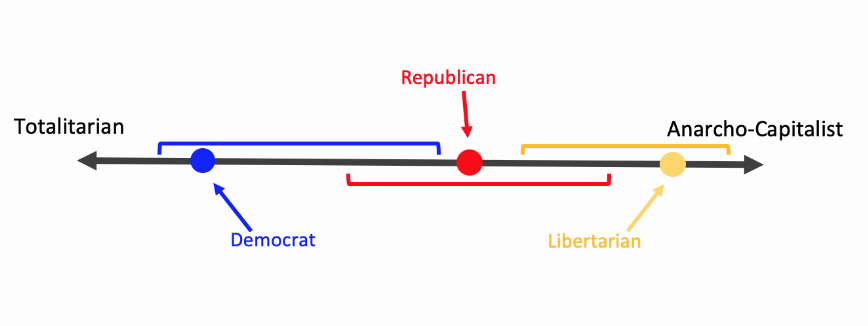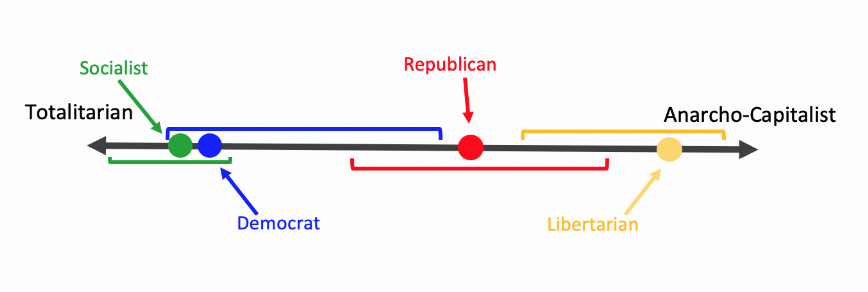The Real Political Compass
The political compass to which people typically refer runs on two axes: an East-West axis of Left to Right, and a North-South axis of Authoritarian to Libertarian.
In reality though, this is a meaningless graph.
Left and Right have no meaningful definition that isn’t directly correlated with Authoritarian and Libertarian, because the political compass has to do with politics.
In other words, the political compass has to do with what should and should not be law.
It is not a description of desirable behavior (obviously it is more desirable for people not to smoke cigarettes, not to be flagrant drunks, not to run out on a pregnant girlfriend, not to play cacophonous music at 2AM).
It is rather a description of those things which are so bad that people deserve to be jailed for doing them.
Therefore the political compass can be collapsed into a single axis:

On the far Left, we have an ideology in which every private decision has been co-opted by government;
nothing may be done without government approval and consent.
On the far Right, we have an ideology in which government cannot exist, because every decision is the purview of the individual.
In the words of Jack Sparrow, the only rules out here are, “What a man can do, and what a man can’t do.”
Libertarians believe that, while Rights - unalienable and God/Nature given -
exist in perpetuity, and that the right to defend those Rights exists in a state of nature, this leads to “Might Makes Right.”
We Libertarians believe that a limited government which is equipped to enforce protections for the Rights to Life, Liberty, and Property,
while not being so large as to be able to violate those same rights, is the ideal towards which we should strive.
To Libertarians, these are the only decisions which should be taken out of the hands of individuals:
the decisions to kill (or otherwise physically harm), enslave (or compel with threats of force), and steal.
All other decisions should be left to individuals to make.
Libertarians land roughly here on the political spectrum:

Republicans tend towards liberty in economic issues,
favoring (moderately) free markets with low taxation, the free alienation of labor, and free association.
However, they are also likely to want government enforcement of certain social norms,
such as traditional marriage, and abstention from the use of drugs.
Republicans are also sometimes inclined to want government protectionism for American workers
(eg, preventing foreign workers from competing against the American labor market).
This is a soft form of collectivism - eg, “Nationalism” -
Whereby people are treated as a group with respect to their country of citizenship.
Libertarians would rather solve this issue with a freer American Labor market - eg, the reduction of regulations and restrictions which make it difficult for American labor to compete on the global stage.
Libertarians who are on the verge of Anarcho-Capitalism tend not to want national borders or voting rights at all, given that these things are provided by government and cannot exist without it. However, most Libertarians (including myself) recognize that national borders are necessary to protect citizens from malicious actors, and that citizenship is a necessary prerequisite to vote. We do, however, tend to favor borders which are more open for the purposes of labor, eg a more global labor market. (Though I personally believe we should not do business with Totalitarian governments which are by definition exploiting their people).
Many Libertarians have made their home in the Republican Party in recent years, and this has expanded the spectrum of that party, particularly liberalizing it on some social issues.
As of now, Republicans tend to land here on the political spectrum:

Democrats have historically been very liberal on social issues, and on many of those issues, they still are. However, with the advent of “Cancel Culture,” Democrats have grown progressively intolerant of things (such as speech) that they don’t like. Many have proposed codifying their preferred social behaviors into law.
Libertarians, on the other hand, recognize that having Rights means that sometimes people will (and may) use those Rights in ways you don’t like.
Democrats are notoriously authoritarian on economic issues, preferring high taxes which disporportionately tax higher incomes, and many legal restrictions on businesses and employers in order to protect consumers and employees from exploitation. Democrats believe that consumers and employees hold weaker bargaining positions than producers and employers, and therefore need government to weigh in on their side.
Libertarians view markets as akin to ecosystems, which achieve a natural balance and move in a direction of constant improvement (so long as rights are protected), due to the fact that people act in general with an eye to improving their lives and the lives of those they care about. Libertarians recgonize that, just as with an ecosystem, selective economic interventions are likely to have catastrophic unintended consequences. We also recognize that freedom means being free to make bad decisions as well as good ones.
Many Socialists have made their home in the Democratic Party in recent years, and this has expanded the spectrum of that party in the direction of Authoritarianism on both economic and social issues.
Typical present day Democrats land roughly here on the political spectrum:

The Socialist movement has been gaining ground in the US in recent years. Socialists believe that economies should be run in total by the government without the need for any individual choice. Socialism requires 100% cooperation from the governed people, which in practice means that citizens under Socialism cannot speak against the government, and cannot arm themselves against the government. In other words, strong social restrictions come with this ideology in addition to the obvious economic Totalitarianism.
Many Democrats are attracted to aspects of Socialism, wanting this sort of authority in (for example) the areas of healthcare or education.
American Socialists land about here on the political spectrum:

I hope this handy guide serves to help you determine which political party is the best vehicle for your beliefs.
Until next time,
Margot Herzl